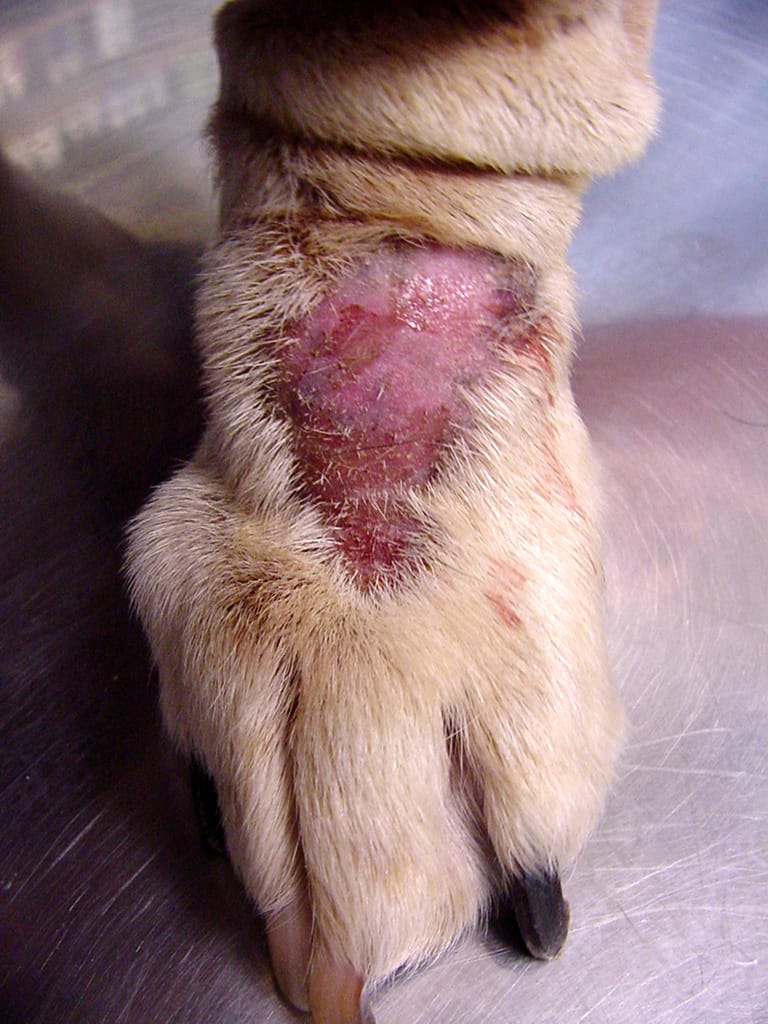Is your dog persistently licking and chewing their paws, even when you try to redirect their attention? This behavior can be concerning for pet owners, and understanding the underlying cause is crucial for your dog’s well-being. Dr. Valentina Henao, a veterinarian and medical director at Veterinary Emergency Group (VEG) in Miami, explains that excessive paw licking can stem from a variety of issues, ranging from common problems like fleas or allergies to more serious paw injuries.
Common Reasons for Excessive Paw Licking
While occasional paw licking is a normal behavior for dogs – serving as a way to explore, self-soothe, or simply clean off dirt from a walk – persistent and intense licking or chewing that causes harm warrants a closer look. If your dog’s paw licking is so excessive that they don’t stop when distracted, it’s time to consult with your veterinarian to identify and address the cause promptly.
1. Injuries or General Pain
Aggressive paw licking or chewing can be a sign of underlying pain or injury. If your dog is experiencing discomfort, you might also notice symptoms like limping, avoiding stairs, or a general decrease in activity. Potential causes of paw pain include:
- Cuts or abrasions: Sharp objects on walks can cause minor injuries.
- Embedded objects: Thorns, glass, or other debris can become lodged in the paw.
- Insect stings or bites: A sting can cause localized pain and swelling, and it’s important to check for and remove any embedded stingers that could lead to allergic reactions.
- Fractures or sprains: More severe injuries to the bones or ligaments in the paw can cause significant pain.
If you suspect an injury, it’s essential to have your veterinarian diagnose and treat the issue.
2. Allergies
Allergies are a frequent culprit behind excessive paw licking in dogs. These reactions can manifest on various parts of the body, including the skin and paws, potentially leading to infections, hot spots, and ear infections. Allergens can originate from environmental factors, such as pollen, dust mites, and mold, or from food ingredients.
Veterinarians often employ a comprehensive approach to manage allergies, which may include:
- Allergy medications: Antihistamines or other prescribed drugs to reduce the allergic response.
- Injections: Specific allergy shots (like Cytopoint) to target underlying causes.
- Topical treatments: Medicated shampoos, conditioners, or sprays to soothe irritated skin.
- Dietary changes: For food intolerences, a limited ingredient diet or a veterinary diet with novel or hydrolyzed proteins may be recommended. Brands like Blue Buffalo Basics offer options for dogs with skin and stomach sensitivities.
If infections arise due to allergies, topical and oral medications, along with a recovery cone to prevent further licking, might be necessary.
3. Fleas and Ticks
Fleas and ticks are common external parasites that can cause intense itching and discomfort, leading dogs to lick and bite at their paws and other areas. These pests can be found in various environments, including bedding, carpets, yards, and tall grasses.
To check for fleas or ticks, use a flea comb to examine your dog’s coat, paying close attention to areas like between the toes, under the legs, and behind the ears. Signs of fleas include the presence of small, moving insects and dark fecal specks (flea dirt). If you find a tick, it’s crucial to remove it carefully and completely using tweezers or a specialized tick removal tool to prevent skin infections.
Preventing and treating flea and tick infestations is straightforward with regular use of veterinary-recommended preventative medications. Consult your veterinarian to determine the most suitable option for your dog.
4. Arthritis
Arthritis, a degenerative joint disease, commonly affects older dogs and can impact not only major joints like the hips and knees but also the toes. This condition involves the breakdown of joint cartilage, leading to pain, inflammation, and reduced mobility in the affected paws.
Several strategies can help manage arthritis and improve your dog’s comfort:
- Exercise and physical therapy: Gentle, low-impact exercises can help maintain joint flexibility and reduce pain.
- Pain and anti-inflammatory medications: Your veterinarian may prescribe medications to alleviate pain and reduce inflammation, depending on the severity of the arthritis.
5. Behavioral Issues
Beyond medical causes, behavioral or psychological issues can also contribute to excessive paw licking. Similar to humans, pets can experience mental health challenges that require professional support from a veterinarian or a veterinary behaviorist. If medical conditions have been ruled out, the licking might be a coping mechanism for anxiety, boredom, or stress.
When to Seek Veterinary Care
While occasional paw licking is normal, prompt veterinary attention is recommended if your dog exhibits any of the following signs:
- Bleeding from the paws
- Swollen paws
- Limping
- Discharge (pus or other fluids) from the paws, indicating infection
- Vocalization (whimpering, crying) or wincing when paws are touched
It is vital to work closely with your veterinarian to diagnose the cause of excessive paw licking. If left untreated, this behavior can escalate, potentially leading to secondary bacterial infections like pododermatitis, which can be painful and challenging to treat. Early detection and intervention are key to a simpler and more effective solution for your dog’s well-being.

